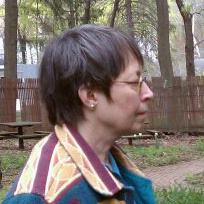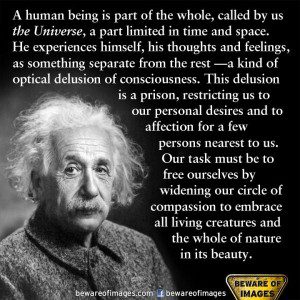ALL BEINGS
A Dharma talk
Benevolent Street Sangha
Boundless Way Zen
November 4, 2013
Jan Seymour-Ford
Recently I’ve been fostering a heretical thought: What’s so good about independence?
For about 20 years I’ve worked in fields that support the rights and dignity of people with disabilities, so this really is kind of a heretical thought. I’ll come back to this.
We enshrine independence in U.S. culture. What IS good about it? Well, it stimulates people to get things done. What’s bad about it? It can lead to isolation, both social and intellectual and spiritual. It can lead to self-congratulation, entitlement, and a lack of compassion. We can become so proud of our independence that we denigrate community and deny the many ways it supports us.
Like every other American, I have never much questioned the primacy of independence. But a few years ago, I read an article that made me realize that the notions of independence that I’ve always taken as universal are not universal. The article was written by a second-generation Chinese-American man – someone who was wholly immersed both in Chinese culture and American culture. The author’s father was elderly, and he had a debilitating stroke. He had good insurance, so the conventional resources were available: occupational therapy, physical therapy, rehabilitation, mobility aids.
But he was not interested in rehabilitation. His son understood that his father had a completely Chinese perspective on his condition. He was an elder who had done everything for the benefit of his family, and he had earned the right to be dependent. He insisted on being waited on hand and foot, and that it was the duty of his family members to do this. And the son was also American enough to resent it and consider it selfish, even as he understood it.
If you’re like me, you’re a bit shocked by someone who would choose dependence. I My reaction told me that I have a lot of unquestioned assumptions about the value of independence.
So what is so important about independence? What’s so bad about needing help? So what if you can’t live by yourself? What’s wrong with humans needing one another?
As I think about it, there is a jewel at the heart of independence — autonomy. The right to decide one’s fate for oneself. To realize that one, and every person, is unique and precious, and his the right to develop one’s gifts and share them with the world. Those of us who are Unitarian Universalists call this the First Principle, which acknowledges the “inherent worth and dignity of every person.”
There’s a rights organization of people who are blind, and there’s a book outlining their history entitled, Walking Alone and Marching Together. It took me a minute to get it—it’s a tribute to autonomy and to interdependence. Walking alone means the right to go to the post office or to work on one’s own. People who were blind had to demand the right to skills that give them autonomy. They did that by marching together. In this case they mostly mean organizing and taking political action, but it goes deeper.
And that deep place is the realization that we’re all woven together. We UU’s are familiar with this in the form of the Seventh Principle: “respect for the interdependent web of existence, of which we are a part.”
Instead of enshrining independence as a supreme value, I suggest we give equal reverence to autonomy and interdependence: to the precious uniqueness of everyone and everything, which is inextricable from the precious uniqueness of every other person and thing.
What does this have to do with our practice? Everything, I think.
When I was writing this talk I looked at my notes from the last talk I gave, to make sure I didn’t say the same thing. Last time I spoke of the importance of Sangha – how it calls for stepping forward to be present, and stepping back to make room for the offerings of others.
And I’m talking about Sangha again right now, along with the other of the three treasures: Buddha and Dharma.
That’s because our practice brings us to realize and cherish both our uniqueness, and how we are woven out of one another – our interdependence.
When I first took shoken with my first teacher many years ago, I had an experience I never expected. For a couple of days, I felt the presence of the thousands and millions of beings who have practiced before me. It was very humbling and very moving. It reminds me that we don’t just do this practice for ourselves—we are interwoven with all beings.
A version of the four vows uses the phrase: All beings, one body. This is what makes the three treasures alive:
Buddha—he is the first in our tradition to awaken to our interdependence.
Dharma—the Law or the Teachings give us the practices to realize it for ourselves.
Sangha—is us and the world. Our presence in the Sangha of practice here and the Sangha of the world is how we live and experience our practice every moment.
We experience that interweaving when we come here together week after week. The very cells of our bodies call us here to be with one another.
Walking alone and marching together – all beings, one body!
…
 Jan Seymour-Ford has been a student of Zen since the late 1980s, when she worked with John Tarrant Roshi of the Pacific Zen Institute. She’s a charter member of Boundless Way Zen, and her current teacher is Melissa Myozen Blacker Roshi, with whom she has worked for more than 10 years. Jan is a Senior Dharma Teacher with the Benevolent Street Sangha in Providence, Rhode Island
Jan Seymour-Ford has been a student of Zen since the late 1980s, when she worked with John Tarrant Roshi of the Pacific Zen Institute. She’s a charter member of Boundless Way Zen, and her current teacher is Melissa Myozen Blacker Roshi, with whom she has worked for more than 10 years. Jan is a Senior Dharma Teacher with the Benevolent Street Sangha in Providence, Rhode Island













